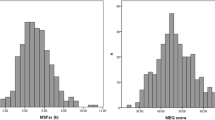Abstract
The original English Morningness-Eveningness Questionnaire (MEQ) was translated into Chinese, and the circadian rhythmicity of 188 healthy Chinese subjects was tested using this version of the MEQ. We assessed the reliability and validity of the Chinese version and determined the cut-off points. In the Chinese version, 19 items were divided into two dimensions (i.e., sleep phase and time of greatest efficiency), and the cut-off points were determined to be the following: definitely evening type (142–46), moderately evening type (472–52), neither type (532–64), moderately morning type (652–69), and definitely morning type (702–86). Additionally, the Cronbach a coefficient was determined to be 0.769, which is satisfactory. The Chinese version of the MEQ has good psychometric properties, and its cut-off points can effectively differentiate between morningness and eveningness.
Similar content being viewed by others
References
Turek FW. Introduction to chronobiology: sleep and the circadian clock. In: Kryger MH, Roth T, Dement WC, eds. Principles and Practices of Sleep Medicine. W. B. Saunders: Philadelphia, PA, 2000; 319–20.
Dijk DJ, Edgar E. Circadian and homeostatic control of wakefulness and sleep. In: Turek FW, Zee PC, eds. Regulation of Sleep and Circadian Rhythms. Marcel Dekker: New York, 1999; 111–47.
Zlomanczuk P, Schwartz WJ. Cellular and molecular mechanisms of circadian rhythms in mammals. In: Turek FW, Zee PC, eds. Regulation of Sleep and Circadian Rhythms. Marcel Dekker: New York, 1999; 309–42.
Dijk DJ, Czeisler CA. Paradoxical timing of the circadian rhythm of sleep propensity serves to consolidate sleep and wakefulness in humans. Neurosci. Lett. 1994; 166: 63–8.
Borbely AA, Achermann P. Sleep homeostasis and models of sleep regulation. J. Biol. Rhythms 1999; 14: 557–68.
Monk T. Shift work: basic principles. In: Kryger MH, Roth T, Dement WC, eds. Principles and Practice of Sleep Medicine. Elsevier Saunders: Philadelphia, PA, 2005; 673.
Czeisler CA, Buxton OM, Khalsa SBS. The human circadian timing system and sleep-wake regulation. In: Kryger MH, Roth T, Dement WC, eds. Principles and Practices of Sleep Medicine. Elsevier Saunders: Philadelphia, PA, 2005; 375–94.
Smith CS, Reilly C, Midkiff K. Evaluation of three circadian rhythm questionnaires with suggestions for an improved measure of morningness. J. Appl. Psychol. 1989; 74: 728–38.
Kerkhof GA. Inter-individual differences in the human circadian system: a review. Biol. Psychol. 1985; 20: 83–112.
Horne JA, Ostberg O. A self-assessment questionnaire to determine morningness-eveningness in human circadian rhythms. Int. J. Chronobiol. 1976; 4: 97–110.
Taillard J, Philip P, Chastang JF, Bioulac B. Validation of Horne and Ostberg morningness-eveningness questionnaire in a middle-aged population of French workers. J. Biol. Rhythms 2004; 19: 76–86.
Comrey AL. Factor-analytic methods of scale development in personality and clinical psychology. J. Consult. Clin. Psychol. 1988; 56: 754–61.
Author information
Authors and Affiliations
Corresponding author
Additional information
The authors declare that they do not have any conflicts of interest related to the data presented in this manuscript.
Rights and permissions
About this article
Cite this article
Li, SX., Li, Qq., Wang, XF. et al. Preliminary test for the Chinese version of the Morningness-Eveningness Questionnaire. Sleep Biol. Rhythms 9, 19–23 (2011). https://doi.org/10.1111/j.1479-8425.2010.00480.x
Accepted:
Published:
Issue Date:
DOI: https://doi.org/10.1111/j.1479-8425.2010.00480.x



